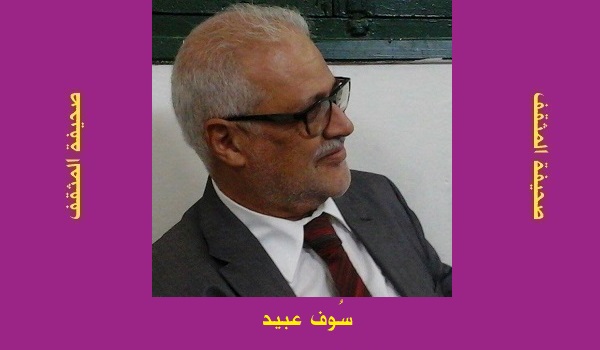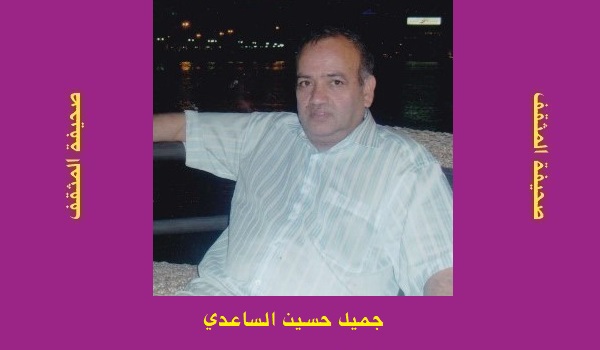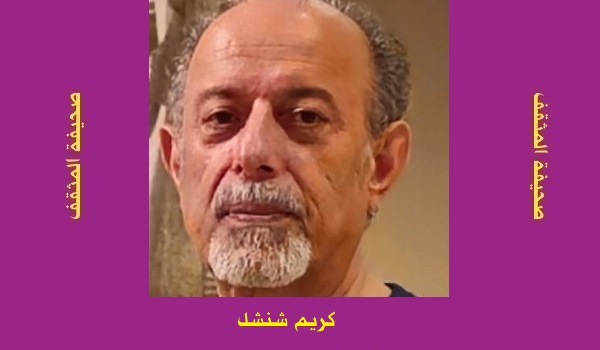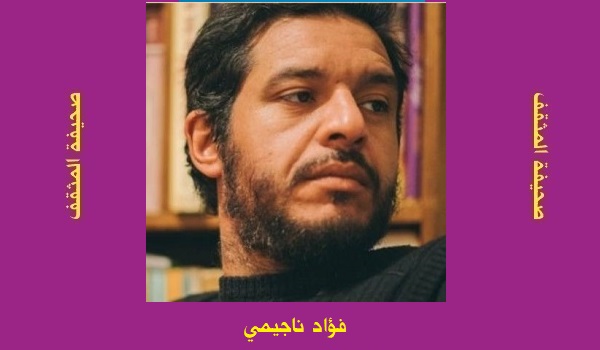ترجمات أدبية
Ali Al-Kasimi: Thirst

by Ali Al-Kasimi
Translated by Hassane Darir
(Professor of Translation and Terminology, Cadi Ayyad University, Marrakech) and
revised by W Richard Oakes Jr. (PhD-University of Edinburgh, Independent Scholar)
***
(Dedicated to the soul of the great artist, Dr. Khaled Al-Jader).
The handset fell out of his hand before he could hear the rest of the interlocutor’s speech. He stumbled towards the door, trying to overcome the tears in his eyes, on his way to the apartment of his friend, the great painter.
In the entrance to the apartment, he saw scattered paintings, some unfinished, and some unframed. Some were hanging on the wall, and others were lying on the ground, but they all seemed dark in color to him, with broken lines, warped perspective, and all covered with a tinge of sorrow buried in the afternoon of that cloudy winter day.
In the dimly lit sitting room, two girls were weeping near a coffin covered in a black cloth. Without paying any attention to them or addressing them, he placed his right hand on the head of the coffin, and began to recite Al-Fatihah and offering supplications for the one lying inside it. Then he rushed into the only bedroom in the apartment, to find the painter's younger brother lying on his face in his bed with his palms on his eyes, so he asked him:
- What about the repatriation of the body?
- I have to wait a couple of days because there is no plane today.
- No, there is a direct flight in two hours. I will call our travel agency to take the necessary measures at the airport, and I will drive my car to the door of the building in five minutes. You have to lower the coffin there.
The car set off like an unruly horse on the seaside road towards the airport, carrying the coffin on board. The two weeping girls occupied the back seat, while the brother of the deceased sat crumpled and silent in the front seat beside him.
Oh, if the deceased were beside him, he would stare, with wide eyes, at the fields on both sides of the road, and gaze, with a smile on his lips, at the peasants bent over doing their work. He would draw the attention of his friend, who was busy driving the car, to the diversity of head coverings worn by these peasants and the richness of their colors, much alike the natural diversity of plants and flowers, and the richness of their culture and heritage. Is there the slightest doubt about that? Let those who do not admit this look at the Eskimos and the people of the desert, who know only one type of headscarf... He also drew his attention to the light of this country. It is that sort of moderate light, in terms of strength and brightness, that enables all the colors in nature to be seen. Oh, it is just the correct amount of light that does not allow one color to dominate another, but rather lets each color exist in harmony with other colors, for there are colors that only the expert eye can perceive, even if language cannot adequately distinguish them. Among the spectra of a single color, there is one color that the painter's heart beats for, his eyes search for its mixture, and his brush pains in imitation. Oh, it is just the correct amount of light that testifies to the essence and purity of colors and shows them as they really are. There is nothing better than what is right to reveal the truth. Do you think it is the winter rains that cause the earth to reveal its breathtaking subtleties in the spring? No, it is the mild, fair, and just spring light that gives the earth its enchanting and alluring colors. Even the most skilled painter will not be able to convey the splendor of nature in his paintings without being supported by a fair, just, and moderate light through which he penetrates to his subject and merges with it, so that the self and the subject become a single entity that comes alive on the surface of the painting...
In this cloudy winter’s afternoon, the light that dazzled and captured you hides behind the clouds, and the fields are desolate from the people you loved.
The road to the airport usually takes an hour and a half, and the check-in at the airport takes at least half an hour. Therefore, he had to drive at an unusual speed of more than 150 kilometers per hour. As soon as the journey began, the darkness lurking behind the dark, green fields crept onto the road, and the wind coming from the sea doubled its speed and drove thick clouds in front of it like raging herds of buffaloes, and soon the raindrops poured in at an escalating pace, raising a real threat that the car might skid on the road that was covered with water and mud. He realized, with apprehension and fear, that he had to focus all of his attention on the road and the car he was driving.
At the airport, his eyes bid farewell to the coffin when it was swallowed up in the belly of the plane, without noticing the farewell greeting that the painter's brother waved as he passed the check-out barrier. He did not wait long, for the plane took off moments later, and soon disappeared into the dark clouds that were like a large black tent over the airport.
It seemed to him that the way back to the city was not as long as it was going to the airport. Although the two girls continued their intermittent wailing, his mind flew away, racing the plane on its flight home. He saw a crowd of mourners, barefoot, bare-headed, carrying the coffin on their skulls, repeating ''Allah Akbar'' (Allah is the Greatest) and "Laa Ilaala illa Allah” (there is no God except Allah), as they hurried into the heart of the desert, where the late artist had been born and where his ancestors had rested for centuries. They carried the coffin on their shoulders, rushing far and wide towards a wide-mouthed grave at the horizon, in an endless desert filled with yellow sand dunes extending beyond the horizon, and blazed by the bright sun, until it turned into a mirage covering the earth and the sky. The closer they got to the grave, the farther away from them it seemed. Suddenly, he saw himself running after them to catch up with them, barefooted, bare-headed, stretching his neck like theirs to carry the coffin along with them. As he approached the coffin, piercing sounds of Tahlil and Takbir began to permeate his ears and eyes, pressing the lining of his heart like a sad flute melody, and a wailing voice sounded:
- I tried to remember who was crying for me, but I couldn't find ...............................
A second voice rose and asked:
- They say don't go away while they bury me, but what place is the furthest away except mine?
Another voice resounded, recommending:
- If I die, bury me beside a vine whose veins would water my bones after my death.
Don't bury me in the desert. I'm afraid if I die, I won't taste it.
However, they continued their vigorous march in a desert that had no spring or pasture. Even the wells were filled, the oases dried, and the palms had committed suicide.
This painstaking mental travel was only interrupted when he stopped the car in front of the house of one of the two girls, so that they could leave together. He returned alone to his house located in one of the distant beaches to which he resorted whenever he was distressed or exhausted, to enjoy some tranquility and comfort, as the houses built on that beach were totally deserted in the winter, since the crowds do not form until the summer season returns.
His house was directly on the beach, only a few meters from the sea, and when the latter was agitated, its waves washed away the stairs of the back door leading to the beach. The front of the house, overlooking the sea, was wide glass windows allowing him to see the sea and hear its roar. His friend, the painter, often came to this house to paint some of his paintings. There, the love of the sea brought the two friends together. They talked about life and death, life after life, death before death, alienation of the body, alienation of the soul, and alienation of thought.
When he arrived at the house, it was pitch dark. The sequential thunder was deafening the hearing, the successive lightning dazzling the eyes, and the storm darkening. Raindrops were large enough that they hit the windshield of the car like machine-gun bullets and turned the alley into a narrow valley with torrential flow. He entered the house, wet and feverish, only to discover a power outage due to the whirlwind.
Without bothering to light a candle, he threw his exhausted body on the big sofa, wrapped himself in the darkness, and stared at nothing. The lightning that penetrated the courtyard from time to time illuminated one of his late friend's wall paintings: There appeared grim faces of villagers, with their bulging eyes, dry lips, and miserable looks shadowed by trees. The trees were exhausted by autumn. A hidden wind had been twisting their branches, scattering their yellowish leaves on the heads of the villagers, whose thick feet were stuck to the ground, like the roots of the trees themselves.
Behold, lightning recedes at a brisk speed, to leave space and air prey to the roar of raging thunder, the buzzing of a mighty storm, and the thunderous roar of the sea. Then lightning returns to light up another painting, from which the face of a black-faced magician appears, with piercing glances directed towards the eyes of a surprised villager who kneels in front of him, mouth wide, lips hanging, pale-faced, like a terrified prey. Then darkness hovers once more, rivaled only by the sound of falling rain and the waves crashing against the hard rocks of the beach. Lightning is once again illuminating another painting, which overlooks the shrine of a saint perched on the seashore. Next to it are three boats resting on the sand. They must have been thrown ashore by the thunderous waves, just before dawn, after their owners the fishermen were swallowed up the during the night. Thus, lightning kept opening his exhausted and resigned eyes at the paintings hung on the wall one after another, and closing them after it receded, neither seeing nor seen. He remained in that condition for a period of time, the length of which he did not know, and the impact of which he did not perceive.
While he was relaxing with his eyes closed, he suddenly heard a strange voice that differed from all the sounds that his ears had heard that night. He sensed a suspicious movement unlike any other movement caused by that evening’s storm. That sound was not coming from the direction of the sea, nor was that movement coming from the source of the west wind, but it seemed to him that they were coming from the eastern side of the house. Unconsciously, before he even had a chance to think, he turned towards the source of the sound and movement, to see... to see with his wide-open eyes, the ghost of his late friend: tall, monstrous, terrible, horrible, in shroud-white, pushing the window wide open, rushing like a soaring missile, like a gigantic comet star, into the center of the house.
Then, he let out a sharp, terrified scream: Why? Why? And he fell unconscious...
***
...................................
This short story is a translation of الظمأ by Ali Al-Kasimi. It is the thirteenth in the short story collection Time to Leave (أوان الرحيل), under translation.







